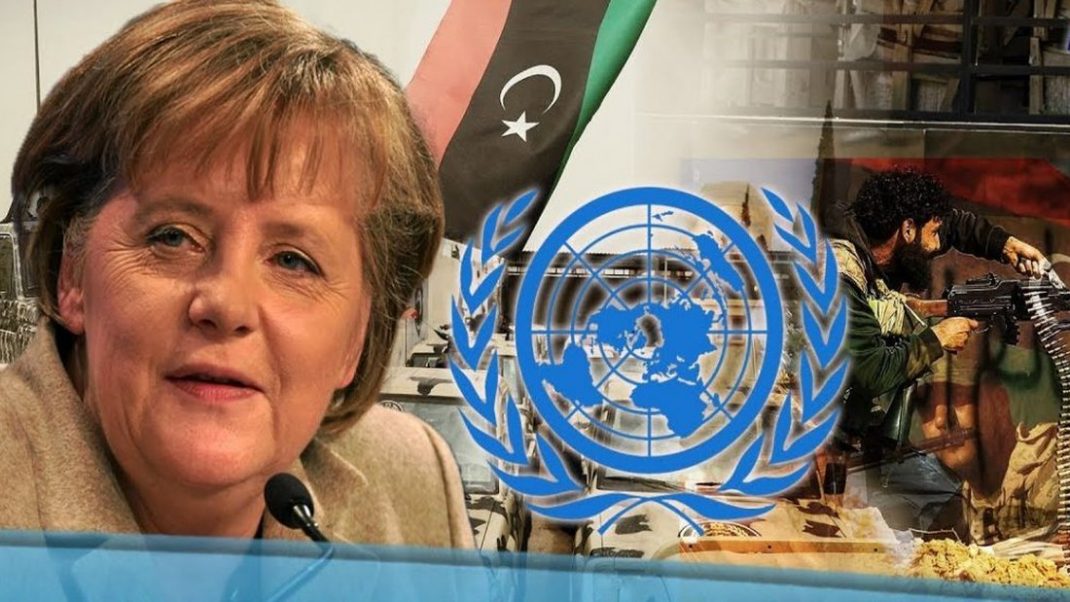By Patrick Wintour
 Violations of embargo have been both routine and often blatant, says UN special envoy.
Violations of embargo have been both routine and often blatant, says UN special envoy.
Germany is planning to hold a UN-backed international conference on the future of Libya in an attempt to force the many regional actors to stop funding and arming the country’s warring sides.
The UN has admitted its strengthened arms embargo on the country has been totally ignored by a range of countries, including Turkey, and the United Arab Emirates.
The UN special envoy, Ghassan Salamé, has come to the view that unless an international spotlight is thrown on the role of the many regional actors, the war will continue indefinably, possibly turning the country into a new Syria.
Speaking in Berlin on Thursday, Heiko Maas, the German foreign minister, hinted at the problems ahead in terms of the aims and guest list for the conference, saying there would be a lot of work to organise such a meeting.
Some countries are unlikely to attend if they believe they are going to be put in the dock for backing one side or another.
Maas added: “Germany wants to launch a consultation process with all relevant actors. There is still a lot of work before we can have such a conference. But we have started working on a process.”
Two previous conferences in the last year, one in Palermo and another in Paris, failed to bring about any breakthrough before Field Marshal Khalifa Haftar, the military commander in the east of Libya, tried to capture the capital, Tripoli, the seat of the UN-recognised government.
Salamé has been touting the idea of a conference for more than two months and in an address to the UN security council called for a three-stage process, including local ceasefires, a national conference and then a national meeting inside Libya.
Maas stressed his work was in support of Salamé, who has been touring European and Middle East capitals in support of his conference plan.
Salamé told the security council: “It remains abundantly clear that without the commitment of key external actors engaged in Libya, the conflict will continue.”
Underlining the scale of the breach of the UN’s authority, he told the UN: “The violence in Libya is exacerbated by the supply of additional arms, ammunition and war materiel into the country.
Violations of the arms embargo have been both routine and often blatant by both of the main parties to the conflict and their respective sponsor member states.”
He revealed the UN panel of experts was investigating over 40 cases of arms embargo breaches of varying magnitude, despite non-cooperation by most of the perpetrator member states. “It is sadly true to say that the arms embargo has been ineffective since 4 April 2019,” he said.
He added: “There have been no interdictions or searches conducted at sea, despite such activities being authorised by UN resolutions The reported recent arrival of thousands of mercenaries into the country risks the further extension and escalation of the conflict.”
He said the purpose of the conference was to “send a strong message on the need for respect of the arms embargo, to commit to non-interference in Libyan affairs and to address the main causes of conflict as formulated by the Libyans themselves and to emphasise its clear and active support for whatever political formula the Libyans agree to.”
With the French president, Emmanuel Macron, focused on brokering peace in Iran, the Italians busy bedding down a new coalition government and Britain preoccupied by Brexit, Germany became the natural European hosts for the conference, and is seen as largely neutral in the conflict between Tripoli and Haftar.
Macron, the UAE, and Egypt are normally cited as the strongest external backers of Haftar.
The clashes between the two sides have left more than 1,000 people dead and about 5,500 wounded, according to the World Health Organization (WHO).
***
Patrick Wintour is diplomatic editor for the Guardian
__________
The Guardian
*****
Germany aims to host Libya conference to stabilize oil producer
By Ulf Laessing & Mahmoud Mourad
 Germany aims to host a conference about Libya this year in conjunction with the United Nations to try to stabilize the oil producing country, where rival factions have been fighting over the capital, Germany’s ambassador to Libya said on Wednesday.
Germany aims to host a conference about Libya this year in conjunction with the United Nations to try to stabilize the oil producing country, where rival factions have been fighting over the capital, Germany’s ambassador to Libya said on Wednesday.
The plans, which are still in the early stages according to diplomats, are the first major diplomatic push since eastern forces loyal to Khalifa Haftar launched in April an offensive to take the capital Tripoli, held by the internationally recognized government of Premier Fayez al-Serraj.
The campaign has displaced more than 120,000 people and derailed years of U.N peace efforts but gone nowhere as Haftar’s Libya National Army (LNA) has been unable to breach Tripoli’s southern suburbs.
U.N. Libya envoy Ghassan Salame last month unveiled plans for an international Libya conference to bring together foreign powers backing rival groups on the ground, without naming a venue.
“Germany therefore initiated a consultation process with key international partners. With sufficient preparatory work these efforts could lead toward a meaningful international event this fall,” Oliver Owcza, Germany’s ambassador to Libya, said on Twitter.
He gave no details on the event announced just after German Chancellor Angela Merkel told parliament the situation in the north African country risked destabilizing the whole of Africa.
Diplomatic sources said the event would be held in Berlin in October or November.
Libya’s conflict has increasingly become a proxy war between foreign powers which have been backing various armed group since the 2011 uprising against Gaddafi – the former rebels have been fighting each other since then.
Haftar, who is allied to a parallel government in the east, has for years enjoyed the military support of Egypt and the United Arab Emirates, U.N. reports say.
Turkey has been backing Serraj and has been sending his forces combat drones and vehicles since the start of the war which has balanced out a military edge for the LNA, diplomats say.
Salame thinks Germany can mediate, as it is seen as impartial in the conflict in contrast to France and Italy, which have been competing for influence and have oil and gas interests in Libya, diplomats say.
Both countries brought Haftar and Serraj plus regional players together at summits in Paris and Palermo last year, but didn’t achieve a breakthrough.
Germany has strong ties with Turkey and Egypt, whose bilateral ties have been strained since the Egyptian military, then led by Abdel al-Fattah al-Sisi, ousted the Islamist President Mohamed Mursi in 2013 after mass protests against his rule.
The conference’s goal would be to push foreign players to enforce an existing arms embargo and for a ceasefire to allow Libyans to meet afterwards for political talks.
Key obstacles will be to get Turkey to sit with top officials from Egypt and the UAE, Western diplomats say.
The Turkish delegation withdrew at the last Libya conference held by Italy in November after Turkey Vice President Fuat Oktay was not allowed to join meetings between Haftar, Serraj, Sisi and European actors such as Italian Prime Minister Giuseppe Conte, according to diplomats.
____________




